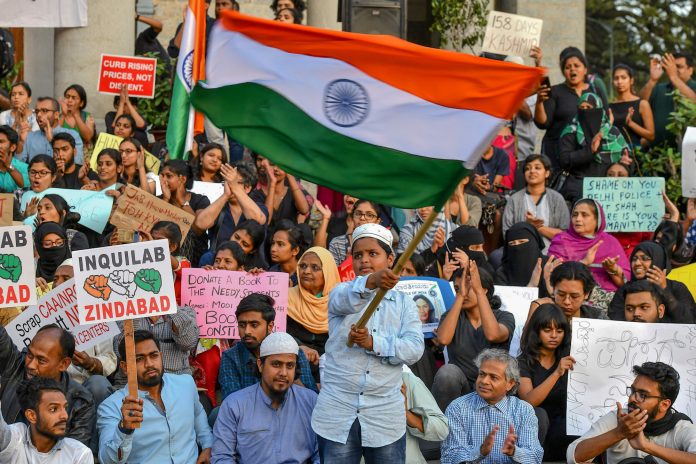Against rising hate crimes against Muslims, polarization and widening rift along communal lines, these Twitter pages run by Muslims are making an effort to alleviate the differences and bring forth stories of harmony and the syncretic culture of India.
Midhat Fatimah | TwoCircles.net
NEW DELHI — Amid the ongoing Hijab row in Karnataka and rising cases of hate crimes against Indian Muslims, many Twitter handles run by Muslim youth have emerged as a platform for the country’s largest minority to raise voice against hate, highlight community achievements, and share the history of the community not covered by the mainstream media.
Ali Sherwani runs a Twitter handle The Muslims Of India, which he started in 2018 with the help of a few like-minded people.
“The issue of persecution and denial of rights to Muslims is not new. Earlier the issues could not reach the masses as easily. Today, social media has enabled increased visibility to the issues of the community,” Sherwani told TwoCircles.net.
The Muslims of India’ was started to connect Indian Muslims and network. The handle regularly shares the community’s achievements and has over 9,000 followers. “The Indian Muslim community is doing some stellar work across the country at the individual as well as at the institutional level. However, such news rarely reaches the public because unfortunately, the private media is very Delhi-centric,” Sherwani said.
Against the backdrop of rising hate crimes against Muslims, polarization and widening rift along communal lines in India, some of these Twitter pages run by Muslims are making an effort to alleviate the differences and bring forth stories of harmony and the syncretic culture of India.
Lessons on Indo-Islamic culture during his college years inspired Ati Ullah, a medical practitioner, to start a Facebook page in 2009 that focussed on the Indo-Muslim culture, contribution of Indian Muslims and India’s syncretism. In 2015, he decided to switch to Twitter and now his page Indo Islamic Culture has over 35,000 followers. “I realized that for my target audience, Twitter is a better platform as it gives a better shot at taking discussions to a global level with a very concise piece of information.”
“I do share news around the current issues faced by Muslims but my focus has remained on diminishing the misconceptions and prejudice against Muslims,” he said.
In 2017, when Umar Ashraf, who runs another similar Twitter page Muslims of India shared an article on the camaraderie between Indian freedom fighter Babu Kunwar Singh and Muslims, he received an emotional message from Singh’s great-grandson thanking the Muslim community for their contribution to the freedom struggle.
Ashraf recalls the impact was such that Babu Kunwar Singh’s great-grandson stopped sharing anti-Muslim posts.
Although these Twitter accounts sharing stories about Muslim issues, culture and history receive appreciation, they have also received an unwarranted amount of attention from the right-wing trolls on Twitter. “Issue of trolling exists on Facebook as well but on Twitter, trolling is very systematically done. I have had to take several precautions to reduce the amount of trolling,” said Ati Ullah.
Sherwani believes there is no point in trying to fight the right-wing trolls. “We have received threats from the trolls but I believe it is better to delete the person and block the account. Right-wing trolls are like salespeople who are selling hate. There is no point in engaging with them,” he said.
He said that Twitter accounts run by Muslims are run by the efforts of an odd number of individuals whereas “the right-wing engages in trolling in a coordinated effort.”
“Through Twitter, the Muslim community has found a way to put our issues in the public domain and get them highlighted through hashtags but the use of Twitter has also made Muslims an easy target for laws like UAPA as there is still need to educate people on how they can effectively engage online and avoid trouble,” said Ashraf whose Twitter account shares information about Muslim personalities and their contributions.
Last year in March, handles with significant reach amplifying Indian Muslims’ issues were suspended by Twitter. The accounts included Indian Muslimahs, Indian Muslims, India’s Muslims among others. Each account had over 20,000 followers and consistently shared issues about the Indian Muslim community. The accounts remain suspended to date, despite Twitter receiving criticism for its alleged technocratic silencing of Muslim voices.
“I have never been part of any online controversial debate but both the pages I run were suspended by Twitter without any explanation for two months which were later restored but my personal account was never recovered so I had to create a new one,” said Ashraf.
Sherwani believes there is a clear bias against Muslims in India. “Today, we need to be very cautious considering the kind of system that is working against Muslims,” he added.
Midhat Fatimah is a freelance journalist based in Delhi. She tweets at @MidhatFatimah


